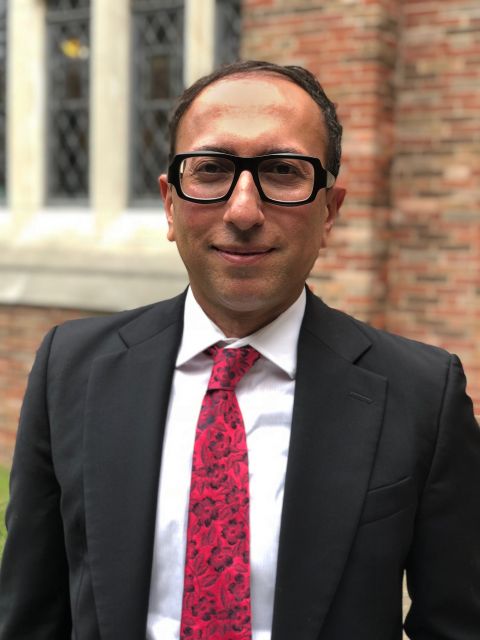
Mohamed Khimji, the inaugural David Allgood Professor in Business Law at Queen’s, is beginning the next phase of his groundbreaking project on shareholder democracy at a U.S. Ivy League school this term. As an Associate Research Scholar in Law at Yale’s Center for the Study of Corporate Law, he will be conducting interviews with financial market participants in New York and Connecticut. This work is part of his long-term empirical study for which he received a five-year Social Sciences and Humanities Research Council (SSHRC) Insight Grant for over $150,000 last year.
“What I’ve enjoyed most about Yale so far is the opportunity to be a part of a welcoming and talented community of accomplished scholars,” says Khimji.
Established in 1999, the Center focuses on matters such as corporate law, financial market regulation, bankruptcy law, corporate reorganization and the law of regulated industries. Its main objective is to increase learning opportunities and faculty research in business law. Khimji’s findings this semester could have expansive implications for all members of the general public who invest in capital markets.
“While at Yale, my research employs qualitative methods to study shareholder activism as a phenomenon,” he explains. “Ultimately, legal rules set incentives. Legal rules should encourage shareholder activism to the extent that it benefits capital markets, and vice versa.”
Khimji seeks insight into two main issues: the process of shareholder engagements and outcomes in engagements that are not publicly announced. He is interested in learning what attracts U.S. investors to Canadian corporations, along with the extent, types and effectiveness of shareholder engagements. To inform his findings, he will interview a multitude of stakeholders, including investment firms, targets, law firms and proxy solicitors.
Receiving funding for this research project is just one of Khimji’s achievements since joining Queen’s as the Allgood Professor in 2016. “My favourite part of the job is working with students and alumni to develop our program with new courses and events,” he says. “Facilitating student-alumni interaction in an academic setting is beneficial, and provides our current students with the opportunity to better project what a successful career in business law could be.”
To that end, he has developed and taught a new Mergers & Acquisitions course, set up Private Equity and Accounting & the Law courses, and re-introduced an offering in Corporate Finance; and with Osler’s Amelia Miao, Law’11, coached a three-student Queen’s team that became the first from a Canadian law school to take part in the Transactional LawMeet at Georgetown University in Washington, D.C.
Beyond academics, Khimji has enhanced the scope of events happening at Queen’s Law. He invited Professor Roberta Romano of Yale Law School to provide the inaugural David Allgood Lecture in Business Law and helped arrange the “Law as a Launchpad” panel, in which alumni described how they translated their law degrees into impressive business careers.
“We have a talented group of students interested in business law with tremendous potential and distinguished alumni in the field who support the school,” he declares. “Queen’s has a large and illustrious public law presence. My objective is to ensure that students interested in business law have an equal opportunity to engage intellectually.”
Khimji wants to see his students flourish well beyond the articling phase.
“Learn as much as possible while in school and take at least some courses in accounting and finance,” he advises students seeking a future in business law. “I want students to not just be successful in securing an articling position but for their careers to progress and develop successfully in the long-term.”
In the meantime, Khimji is eager to embark on this new phase of his research at Yale.
“The pizza in New Haven isn’t bad, either,” he adds.
By Justin Murphy